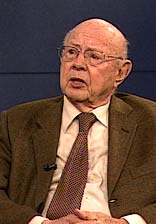Robert Scalapino
(academic) | |||||||||||||||||||||||||||
|---|---|---|---|---|---|---|---|---|---|---|---|---|---|---|---|---|---|---|---|---|---|---|---|---|---|---|---|
 | |||||||||||||||||||||||||||
| Born | 19 October 1919 Leavenworth, Kansas | ||||||||||||||||||||||||||
| Died | 1 November 2011 (Age 92) | ||||||||||||||||||||||||||
| Nationality | American | ||||||||||||||||||||||||||
| Alma mater | Santa Barbara College, Harvard University | ||||||||||||||||||||||||||
| Member of | Atlantic Council/Board, Council on Foreign Relations/Historical Members | ||||||||||||||||||||||||||
| Interests | East Asia | ||||||||||||||||||||||||||
CFR and State Department expert on East Asia. Advocated closer relations with China years before President Richard M. Nixon’s historic 1972 visit. Wanted detente with North Korea in the 1990s.
| |||||||||||||||||||||||||||
Robert A. Scalapino was a Professor in East Asian at the Berkeley University of Berkeley, California for six decades, where he was founding director of the Institute of East Asian Studies. He attended the 1972and 1994 Bilderberg meetings. He was one of the founders and first chairman of the National Committee on United States – China Relations.
Scalapino was advisor to heads of state and key policy makers around the world, including three U.S. presidents. He was a frequent visitor to the People's Republic of China, Japan, North Korea, South Korea, Taiwan and the countries of Southeast Asia and Central Asia. He twice headed an American delegation to Korea, and he was a visiting lecturer at Peking University in 1981, 1985 and 1999.
Background
He received his B.A. degree from Santa Barbara College (later to become U.C. Santa Barbara), and his both his M.A. and Ph.D. degrees from Harvard University.
During World War II he worked in U.S. Naval Intelligence from 1943 to 1946, where he studied Japanese.[1][2] He reached the rank of lieutenant junior grade.
Career
After graduating from Harvard, Scalapino remained there for a year teaching as an instructor, and then went to the University of California at Berkeley as an assistant professor in 1949. He achieved full professor status in 1956, and took emeritus status in 1990. He was chair of Department of Political Science from 1962 to 1965. He founded and was the first director of the Institute of East Asian Studies, one of Berkeley's largest and best endowed research units, from 1978 to 1990.
Between 1965 and 1980, he was a member of the State Department Advisory Committees on East Asia and on China and advised "other government agencies."[3]
Professor Scalapino became an influential analyst of the Japanese political system. He called it a "one-and-a-half party" system in which the dominant Liberal Democrats maneuvered with minority parties to govern.[3]
Scalapino advised secretaries of state like Henry Kissinger, advocating closer relations with China years before President Richard M. Nixon’s historic 1972 visit, and condemning "flagrant" human rights abuses in Taiwan in the 1960s.[3]
He was a proponent of the war in Vietnam, where he in the New York Times that the war tested "the American capacity to respond to a threat that is important but not terminal." In 1967, after he helped write a report with 13 other academics arguing that the war’s prosecution was a "moderate" course, four professors at the University of Pennsylvania wrote a letter to The Times saying that "destroying a small country" was immoral.
He sat on the board of directors of the Council on Foreign Relations 1982-1989.[4] He was editor of the scholarly journal, Asian Survey, from 1962 to January 1996. Scalapino remained active into his late 80s, being a government consultant and testifying at Congressional hearings.
In 2002, he worked behind the scenes to arrange for a group of American experts on Korea to visit North Korea. The trip was canceled after President George W. Bush included North Korea in what he called "the axis of evil."[3]
Scalapino published some 553 articles and 39 books or monographs on Asian politics and U.S. Asian policy.[5]
He retired from teaching in 1990, but remained active in political and development issues in Asia.[6]
Scalapino was a Fellow of the American Academy of Arts and Sciences]] and was a founder and first chairman of the National Committee on U.S.-China Relations. At the time of his death he was a member of the Northeast Asia Cooperation Dialogue, the Board of Trustees of The Asia Foundation and the Advisory Boards of the Atlantic Council, the Pacific Forum-CSIS, and the National Bureau of Asian Research.[5]
Together with his co-author Chong-Sik Lee, he won the 1974 Woodrow Wilson Foundation Award for the best book on government, politics, or international affairs as awarded by the American Political Science Association.
Events Participated in
| Event | Start | End | Location(s) | Description |
|---|---|---|---|---|
| Bilderberg/1972 | 21 April 1972 | 23 April 1972 | Belgium Hotel La Reserve Knokke | The 21st Bilderberg, 102 guests. It spawned the Trilateral Commission. |
| Bilderberg/1994 | 2 June 1994 | 5 June 1994 | Finland Helsinki | The 42nd Bilderberg, in Helsinki. |
References
- ↑ https://web.archive.org/web/20100610155840/http://ucblibraries.colorado.edu/archives/collections/jlsp/interpreter141.doc
- ↑ "Forgotten WWII Patriots, Instrumental in Pacific Victory, to be Honored by U.S. Navy" AScribe Newswire 22 October 2002, accessed 15 February 2010 via Lexis/Nexis subscription service
- ↑ a b c d https://www.nytimes.com/2011/11/13/world/asia/robert-a-scalapino-scholar-of-asian-politics-dies-at-92.html?_r=1&ref=obituaries
- ↑ http://www.cfr.org/about/history/cfr/appendix.html
- ↑ a b https://ieas.berkeley.edu/memoriam-robert-scalapino
- ↑ https://ieas.berkeley.edu/ieas-home/people/ieas-director